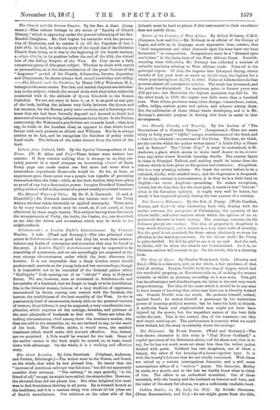The Church and the Roman Empire. By the Rev. A.
Carr. (Long- mans.)—This volume belongs to the series of "Epochs of Church History," which is appearing under the general editorship of the Rev. Mandell Creighton. Mr. Carr begins his narrative with the persecu- tion of Diocletian, and he carries it on till the Popedom of Leo I. (410.460). In fact, he tells the story of the rapid rise of the Christian Church from being, as it was in the beginning of the fourth century, a religio illkita, to its position before the end of the fifth, the virtual heir of the falling Empire of the West. Mr. Carr shows a fully competent grasp of this great subject. Whether he deals with events or personalities, as in his characterisation of the great Doctors of the "Augustan" period of the Church, Athanasins, Jerome, Augustine, and Chrysoetom, he shows always both sound knowledge and ability. —The Church and The Puritans, by Henry Olney Wakeman, MA., belongs to the same series. The first and second chapters are introduc- tory to the subject ; indeed, the second deals with what is but indirectly connected with it, the attitude of Queen Elizabeth to the Roman Catholics. We are not sorry to have it, as it is as good as any part of the book, holding the balance very fairly between the Queen and her enemies; for the Roman party were enemies, and a Sovereign who knew that she had been formally deposed and doomed to death had somesort of excuse for being indiscriminate in her blows. In the Puritan controversy, Mr. Wakeman'e proclivities are towards Laud,—that is to say, he bolds to the Laudian ideal, as opposed to that which found favour with such prelates as Abbott and Williams. But he is always anxious to be fair, and he recognises the blunders of policy which Laud made. The defects of the index detract from the value of the book.























































 Previous page
Previous page